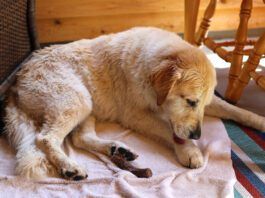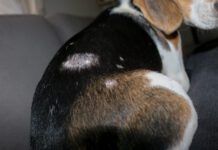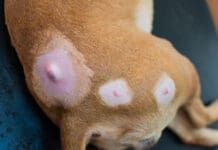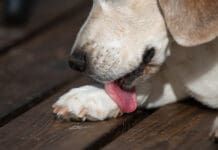Identifying and Treating Staph Infections in Dogs
Symptoms of a superficial staph infection include hair loss and the presence of pustules. It can worsen into a deep staph infection with fever, pain, and crusting skin.
Can Dogs Get Poison Ivy?
Poison ivy can affect our dogs, but luckily most dogs have enough hair that the sap usually does not get down to skin. However, any dogs with condition that leaves them with exposed bare skin are all susceptible to the rash.
Is That a Cyst or a Tumor?
A “cyst” is a capsule that usually has fluid in it, although it can have air as well. “Tumor” is a general term, basically a generic swelling or mass.
Apoquel Quickly Addresses Itchy Skin
A dog who constantly scratches himself due to dermatitis may respond well to Apoquel.
Can Dogs be Allergic to Cats?
Dogs can be allergic to a wide variety of environmental allergens including pollen from trees, weeds, and grasses. This list of allergens includes cat dander.
Home Remedies for Itchy Dogs
When itching starts, consider what might have caused that reaction. Home remedies for itchy dogs might help, but only if they address the cause of itching.
How to Handle Dog Skin Conditions
Dogs can have many different skin conditions. Some skin problems are minor and easily fixed, while others are trickier to diagnose. Some may be controllable but not curable, while others can be cured. It makes sense with any skin condition to begin with basic treatment options, like parasite control if you see fleas.
A Guide to Dog Allergy Medications
There are several manifestations of allergies in dogs, including atopic and flea allergy dermatitis, allergic rhinitis and bronchitis, hives, and insect bite hypersensitivity. Symptoms...
Acral Lick Dermatitis in Dogs
Acral lick dermatitis is an area that becomes bald with raised skin that may ulcerate or bleed as your dog excessively links it.
Why Your Dog is Licking Their Back Near the Tail
If your dog keeps licking their back near the tail it indicates discomfort due to allergies, fleas, hot spots or other issue to investigate.
Dog Mange Mites on Humans
You can get sarcoptic mange from your dog. but the canine variant of the sarcoptic mange mite can’t fully reproduce in people, so symptoms will fade in 4 or 5 days.
Why Do Dogs Smell Like Fritos?
If your dog’s feet have a slight eau de corn chip, don’t worry. This smell is just from the normal bacteria that end up on dog feet throughout daily life.


















